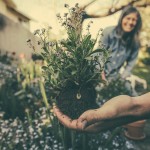
Photo Credit: Nicole Mason, https://unsplash.com/photos/T3S8mPD39bg
Simone Weil, in The Need for Roots, noted that
To be rooted is perhaps the most important and least recognized need of the human soul. It is one of the hardest to define. A human being has roots by virtue of his real, active and natural participation in the life of a community which preserves in living shape certain particular treasures of the past and certain particular expectations for the future
When we participate through growing into a place and a community, it molds us as much as we impress ourselves into it. Now, I am not going so far as to argue for a homogeneous place and community living in that place; nor do I mean to suggest that it is impossible to find a fit through moving, perhaps even one that fits you better than your place of origin. And I am certainly not suggesting we reject all other places and people in some sort of over-hyped nationalism; though patriotism as a virtue is a good thing. In fact, I would say that a true community is one which recognizes its members even when they come from beyond it. However, there is something to be said for throwing in our lot with a people and a place. Robert Macfarlane, in the breathtaking work Landmarks, describes this as “a care of attention towards a place” which like “[care of attention] towards a person — is to achieve a sympathetic intimacy with it.” This is not unlike Heidegger’s understanding of dwelling as something we dwell in and build by means of our very dwelling. We join with the people and location we are living in.
Now, for all his linguistic twists and turns and less-than savory political activities, Heidegger wrote rather well on the idea of place, which he connected to the notion of dwelling and the activity of poetry. He wrote this brilliant statement on homelessness, which I think applies just as fairly to the rootlessness experienced by myself and so many of my contemporaries. In Poetry, Language, Thought, he argues that:
However hard and bitter, however hampering and threatening the lack of homes remains, the real plight of dwelling does not lie merely in a lack of houses…The real dwelling plight lies in this, that mortals ever search anew for the nature of dwelling, that they must ever learn to dwell. What if man’s homelessness consisted in this, that man does not even think of the real plight of dwelling as the plight? Yet as soon as man gives thought to his homelessness, it is a misery no longer. Rightly considered and kept well in mind, it is the sole summons that calls mortals into their dwelling.
But how else can mortals answer this summons than by trying on their part on their own, to bring dwelling to the fullness of its nature? This they accomplish when they build out of dwelling, and think for the sake of dwelling.
When we know we are not dwelling, when we have not learned to dwell, to put down roots, to throw in our lot with the others around us, we can only begin to change by first recognizing our role in the community as members in a greater whole. I am as bad about living this as anyone, because it’s hard to move beyond nostalgia for the communities I have left. And yet, I am here, and nowhere else, and the time I face is now and not some future time. In this, I believe the best any of us can do as we live out these transient periods of life is to let go of our awareness of the nomadic lives we live; finding a kind of if not union then certainly communion with the place in which we are.
As I have been moving, I have also been working through Roger Scruton’s Modern Philosophy: An Introduction and Survey. At the very end of the book, he concludes with an exploration of the social construction of self, and he suggests that the project of modern philosophy is one that, in its best case, turns us to the individual as part of the community. He writes that
Communities are not formed through the fusion or agreement of rational individuals: it is rational individuals who are formed first. Membership comes first, and is the precondition of the outlook that would reject it….However complete we may feel in our solitude, the community is latent in our concepts and in the experiences that are shaped by them. The subjective viewpoint, as we encounter it in aesthetic or religious experience, is not a retreat from others, but a search for the community in which we are truly at one with them. All that is ‘inward,’ ‘private’ and ‘holy’ is in reality most outwardly directed, most urgent and plaintive in its search for the order to which we belong, and in which we may lose ourselves.
Perhaps, then, a habit of being in is really a habit of communion. To long for a habit of being in is to long for rootedness in a place, to long for communion with others, to long for the drawing out of ourselves that comes from an authentic encounter with the things and people of this world who shape us and are shaped by us. It is not to say that we cannot move or be happy elsewhere, but to say that just because I can be happy here or there does not mean there is not a specific being-ness to the here that is not present in the there. Moreover, such specific being-ness is important to who I become by being there. Seamus Heaney, in his essay Belfast, concluded that “my quest for definition, while it may lead backward, is conducted in the living speech of the landscape I was born into.” Perhaps this can be actual or intellectual or spiritual or cultural birth; being quite unsettled myself, I could not say. It’s hard to conclude an essay when I am myself in an awkward in between state of being in and not being in, surrounded on all sides by boxes. So, forgive me if instead I observe this place I am in, and borrow the words of yet another poet, Patrick Kavanagh, and conclude by acknowledging my current habit of being in the place I am pulling up roots:
My bed in the centre
is many things to me:
A dining table
A writing desk
and a slumber palace.
My room is a musty attic
But its little window
Lets in the stars.












